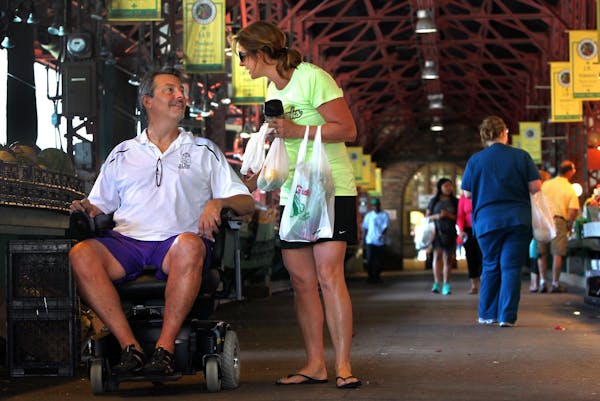Paul Wild has been a reliable research volunteer at the University of Minnesota for 20 years, participating in two landmark studies that changed the standard of care for diabetes, a disease that afflicts more than 24 million Americans.
"Looking back, it was probably the best thing I ever did," said the 61-year-old Mendota Heights dentist.
Now, Wild is among 480 patients being recruited for a $24 million, 3½-year test to see whether a medication that has been used routinely to prevent gout can delay the onset of potentially fatal kidney disease in patients with Type 1 diabetes.
If the study succeeds, the medication, called allopurinol, could be to diabetic kidney disease what baby aspirin is to heart attacks, said Dr. Luiza Caramori, an endocrinologist helping to oversee the study at the U. The drug could delay the need for dialysis and kidney transplants by eight to 10 years, she said, saving thousands of lives and tens of millions of dollars in medical spending.
Diabetes has reached epidemic proportions in the United States, with rates increasing so fast that researchers predict 1 in 3 Americans born after 2000 could develop either Type 1 or Type 2. As many as 30 percent of diabetics will develop serious kidney disease within 10 to 20 years of their diagnosis, making it the leading cause of kidney failure in the United States. And because the waiting list for a kidney is so long, hundreds of patients die each year waiting for a transplant.
While the U study is limited to subjects with Type 1 diabetes, Caramori said positive findings will likely benefit the far more common Type 2 diabetics, as well.
"It's amazing that in the past 20 years we've basically made no progress in delaying kidney disease in patients with diabetes," she said. "It's also disappointing and scary, because the rates of complications are quite high in these patients."
Type 1 diabetes occurs when the immune system destroys the body's ability to produce insulin. It affects fewer than 1 in 10 diabetics. The much more common Type 2 often results from genetic predisposition, coupled with obesity and lifestyle factors, leading initially to resistance to the body's own insulin.
The U is one of seven U.S. sites and two international locations recruiting participants for the study, which is being led by Dr. Michael Mauer, a professor of pediatrics and medicine at the U's medical school, and Dr. Alessandro Doria, an epidemiologist at Joslin Diabetes Center and associate professor at Harvard Medical School.
If allopurinol works as expected, it could become the standard treatment for treating diabetic kidney complications, Doria said in comments released last year.
Study seeking volunteers
Results from three small preliminary studies indicate that allopurinol shows real promise. It suppresses the production of an enzyme, xanthine oxidase, a result of metabolic activity, which can lead to excess acid in the urine. The World Health Organization lists it as an essential medicine for health systems.
It's also cheap and has been used in the Untied States for nearly 50 years to prevent gout flare-ups.
The study seeks volunteers between 18 and 70 who've been diagnosed with Type 1 diabetes for at least eight years and who are concerned about possible kidney disease.
Although allopurinol is generally safe, researchers will screen study applicants for possible drug interactions and for a genetic profile that puts some at risk for a rare, serious skin disease.
The study will assign subjects randomly to two equal groups. They will get either allopurinol or a placebo — neither the patients nor their doctors will know which — and they'll have to visit a study center or a site working remotely with the centers 17 times over three years for a variety of procedures and tests.
The U is one of nine institutions known as the Preventing Early Renal Function Loss in Diabetes (PERL) Consortium, which received the $24.3 million grant from the National Institute of Diabetes and Digestive and Kidney Diseases, a division of the National Institutes of Health (NIH). The nonprofit Juvenile Diabetes Research Foundation also is contributing to the PERL study.
Caramori said that leading diabetic researchers are involved and that they have big hopes for it.
Diabetics account for about 45 percent of people with end-stage kidney disease. Caramori said the survival rate, once they enter dialysis, is very low.
"So there's a big fight trying to bring funds to diabetes research. There's a lot of money allocated to cancer that can benefit, of course, many patients. But even more funds are allocated to AIDS, for example, where the fraction of the population that's affected is much smaller," she said. Though both diseases are important, by comparison, she said, "We are not doing well in terms of spending money in diabetes research."
The allopurinol study is the only kidney disease trial and the only Type 1 diabetes trial that NIH funded this year.
Yet it's not easy to find Type 1 diabetics who meet the study's design criteria. Each study center is seeking 50 to 55 participants. HealthPartners, Hennepin County Medical Center and Essentia Health in Duluth are helping to recruit patients for the U center.
Of those interviewed as of July 7, 119 have gone through initial lab tests, including 14 at the U. Just 36 volunteers were cleared for additional tests.
Caramori said that recruitment is running well behind schedule and that the NIH extended the recruitment deadline to August 2015. Even so, she said. "If we are successful in recruiting these people, I think it's very unlikely we are going to have a negative study."
Dan Browning • 612-673-4493

Minnesota Sports Hall of Fame: A class-by-class list of all members

This retired journalist changed professional wrestling from Mankato

